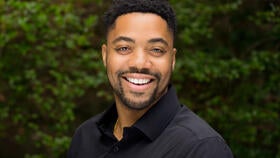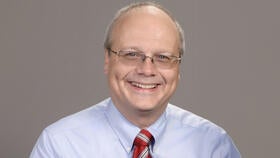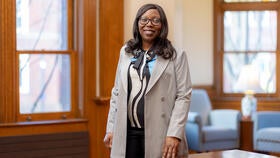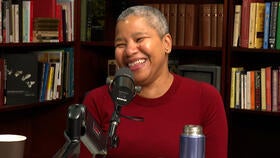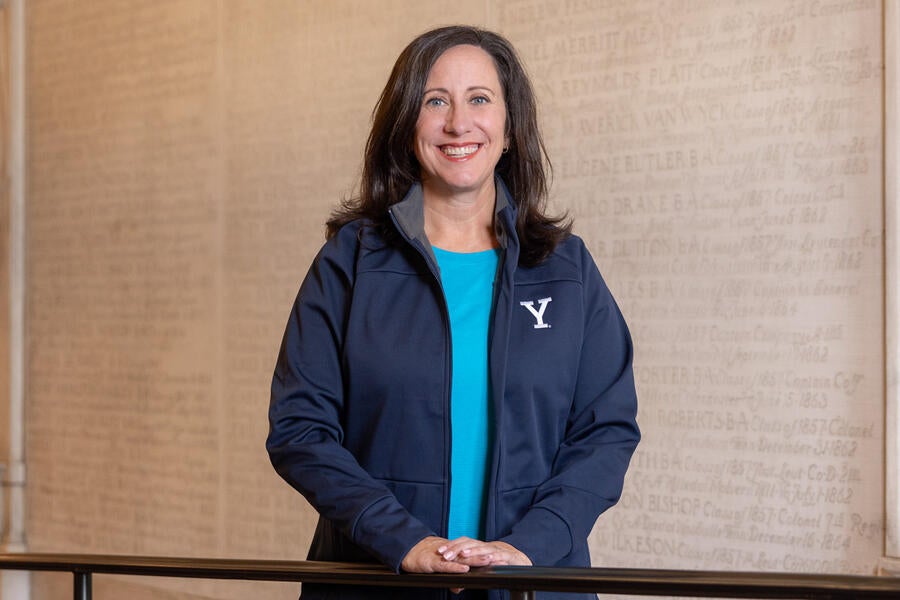
Holly Hermes has two roles: serving her country on military duty and supporting Yale’s military community as a civilian. As a part-time U.S. Air Force Reservist and former active-duty member, Holly understands the commitment and challenges of military duties. As the university liaison for Veteran and Military Affairs, she is a mentor and champion for Yale’s active military members and veterans. A U.S. Air Force colonel, she serves as the reserve advisor for the commander of Civil Air Patrol – U.S. Air Force out of Maxwell Air Force Base in Montgomery, Alabama.
The Yale Veterans Network (YVN) primarily serves faculty and staff but also welcomes students. Established in 2013, the group supports veterans and allies through community engagement and career development. The YVN Steering Committee meets monthly and is open to all. The committee partners with other affinity groups on a variety of campus events and programs.
Hermes grew up in a military family. Her grandparents, father, and sister all served in different branches. The daughter of a career U.S. Army officer, she moved every two years, living all over the world and attending many different schools. Today, Hermes, her husband Eric, and their family call Connecticut home and have strong ties to the Yale community.
Hermes sat down with YourYale to discuss her career. This interview has been lightly edited and condensed.
Can you describe your military background and why you decided to enlist?
For me, the military was “the family business.” My father and sister served in the U.S. Army. Both my grandparents served during World War II; my grandmother was in the U.S. Army Nurse Corps; and my grandfather was a bombardier in the U.S. Army Air Corps. He was shot down during the Korean War and spent years recovering from his wounds.
When thinking about college, I looked to the military for its educational benefits and knew with a Reserve Officers’ Training Corps (ROTC) scholarship, I could attend a top-tier school. I graduated from the University of Notre Dame with a Bachelor of Business Administration degree in marketing. The U.S. Air Force commissioned me as a second lieutenant, and I actively served in the U.S. and overseas for the next six years, earning the rank of captain.
What brought you to Yale?
I met my husband, then a flight surgeon, while on active duty. Using the GI Bill, he did his residency in psychiatry at Yale School of Medicine (YSM). After he completed his residency, we stayed in the area. He now works at the West Haven VA Medical Center and is an associate professor of psychiatry at YSM. We’ve called Connecticut home for the past 15 years, and I’ve been employed at Yale for eight years.
You took over as university liaison for veteran and military affairs this past year. Tell me about your current role.
I’m responsible for engaging with the Yale community, alumni, and families who are military or veterans to strengthen and enhance their experience here. This is part of the university’s Belonging at Yale initiatives. Members of the military and our veterans are part of that effort to foster a diverse community. I also support and advise Yale’s ROTC groups and help them navigate the university.
Jennifer (Jen) VanBrederode, coordinator for veteran and military student resources, works with me in this effort. In this new position, Jen coordinates education benefits for undergraduates and graduate students. She is the main point of contact, providing guidance and support related to military and veteran resources for our student population.
How do you find your role as an active member of the military ties to your work at Yale?
I am in the U.S. Air Force Reserve on a part-time basis. The duty schedule allows me to have a civilian job while being a citizen airman. I assist active-duty members on a part-time basis (about 30 to 45 days a year) and balance it with my regular job. Yale supports my being on military leave to accomplish that duty.
My military background and experience fit nicely with my current role at Yale. I have one foot in both communities and understand what veterans or active-duty members might be dealing with. I was an ROTC student, and I’ve used tuition assistance on active duty and GI Bill benefits as a veteran. I understand what our students and staff need to fulfill their military commitment, and I’m familiar with what it is like to balance military duties with civilian life and family obligations.
Serving on active duty or in the reserves can come with challenges. Members or individuals will work a 40-hour week at their civilian jobs and go straight to military service on the weekends, often working 12 days straight with long hours. At that pace, they must have support from their civilian employer and family. Managers at Yale are very supportive of our reservists, but they can always use more information about how military and civilian employers work. There is also a significant paperwork process for military leave and returning to a civilian job. I’m happy to work with reservists and supervisors to explain the schedule, military orders, and process.
What is your favorite part about working at Yale?
I enjoy working closely with the students and connecting them with our Yale staff and faculty. Yale plays an important role in creating future leaders for the military through ROTC as well as training student veterans to be leaders in society after their time in service. It’s wonderful to be part of their experience here.
What are your goals for the coming year?
I’ve been tasked with strengthening and enhancing the Yale experience for our veterans and active military members. To do that, I want to understand what our community needs. We’ve done several focus groups, and I’ve met with various individuals across campus for valuable feedback. Once we assemble all this input, we will evaluate what the current needs, opportunities, and challenges are, and then prioritize what is most critical.
The Yale community values the experience and contributions of our veterans. I want our veterans, active military members, and their families to know they belong here. Sometimes, veterans are hesitant about identifying their military status. I’m here to reinforce that our veterans are valued, and to support them by consolidating the available resources and then communicating these opportunities to them. I’d also like to create more collaboration between alumni veterans, like the Yale Veterans Association, and continue to work with the Yale Veteran’s Network and the other affinity groups.



